International Business Management: Tesla Motors Analysis Report
VerifiedAdded on 2023/04/24
|10
|3641
|237
Report
AI Summary
This report provides a comprehensive analysis of Tesla Motors' international business operations. It begins with a profile of Tesla, its products, and its global presence, followed by an examination of the impact of globalization and technology on the company. The report then delves into Tesla's market entry strategy, focusing on the Australian market and comparing the cultural dimensions of the US and Australia using Hofstede's model. It explores the benefits and pitfalls of a wholly owned subsidiary market entry strategy, including greenfield investments. The analysis highlights the competitive landscape, particularly the rise of electric vehicles and the strategies of competitors like General Motors and Mercedes-Benz. The report concludes by emphasizing the importance of innovation and adapting to the evolving global business environment.
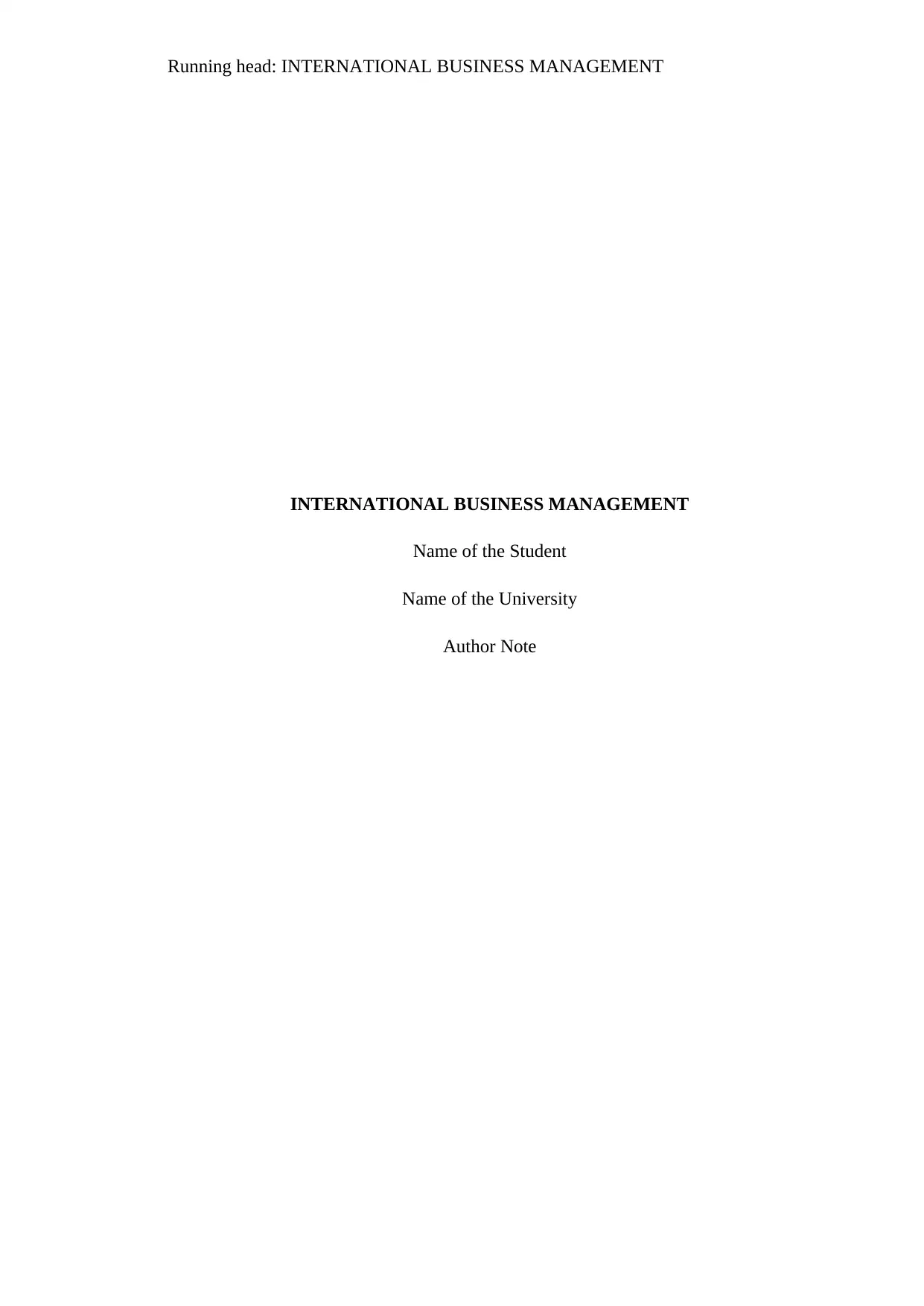
Running head: INTERNATIONAL BUSINESS MANAGEMENT
INTERNATIONAL BUSINESS MANAGEMENT
Name of the Student
Name of the University
Author Note
INTERNATIONAL BUSINESS MANAGEMENT
Name of the Student
Name of the University
Author Note
Paraphrase This Document
Need a fresh take? Get an instant paraphrase of this document with our AI Paraphraser
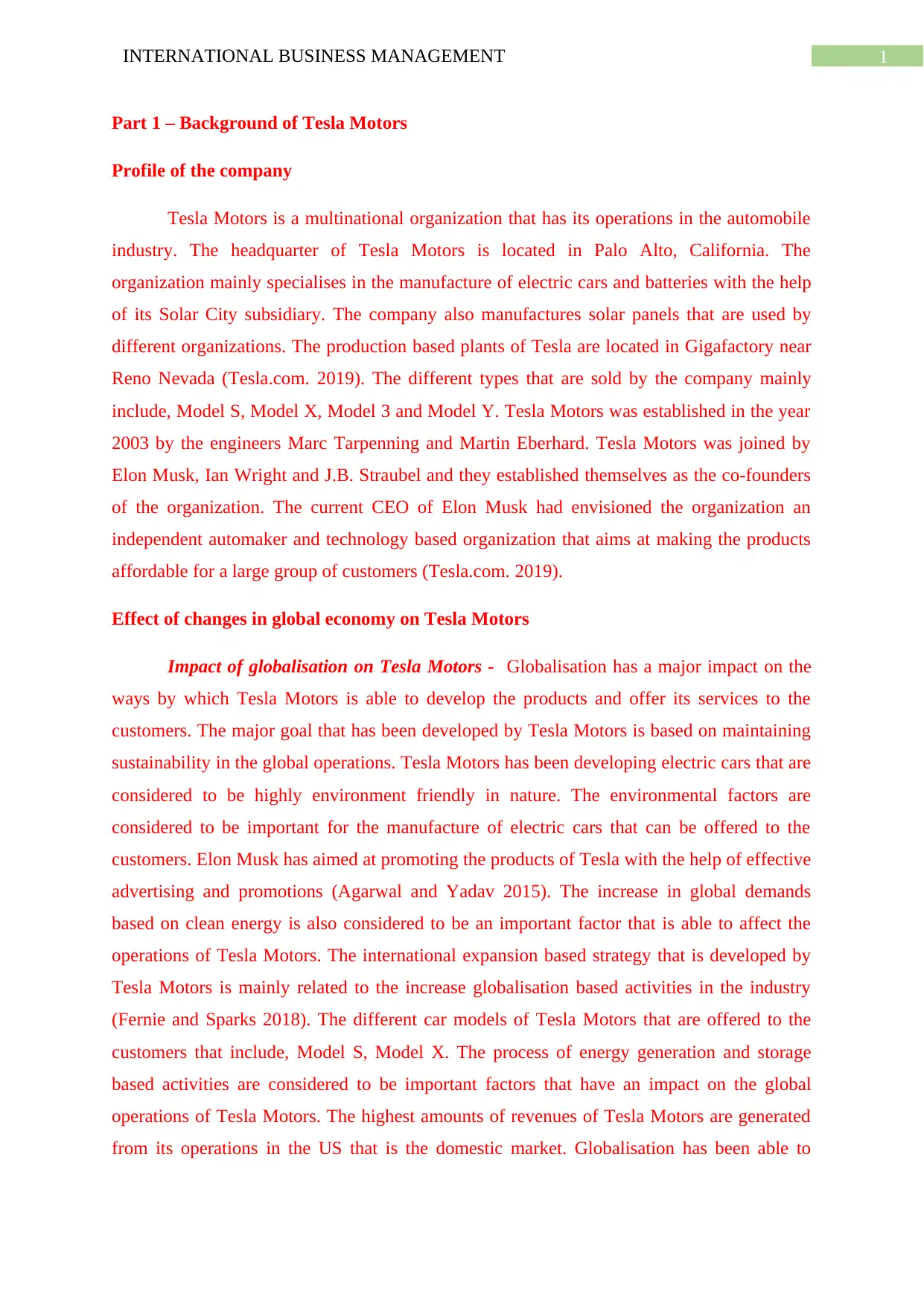
1INTERNATIONAL BUSINESS MANAGEMENT
Part 1 – Background of Tesla Motors
Profile of the company
Tesla Motors is a multinational organization that has its operations in the automobile
industry. The headquarter of Tesla Motors is located in Palo Alto, California. The
organization mainly specialises in the manufacture of electric cars and batteries with the help
of its Solar City subsidiary. The company also manufactures solar panels that are used by
different organizations. The production based plants of Tesla are located in Gigafactory near
Reno Nevada (Tesla.com. 2019). The different types that are sold by the company mainly
include, Model S, Model X, Model 3 and Model Y. Tesla Motors was established in the year
2003 by the engineers Marc Tarpenning and Martin Eberhard. Tesla Motors was joined by
Elon Musk, Ian Wright and J.B. Straubel and they established themselves as the co-founders
of the organization. The current CEO of Elon Musk had envisioned the organization an
independent automaker and technology based organization that aims at making the products
affordable for a large group of customers (Tesla.com. 2019).
Effect of changes in global economy on Tesla Motors
Impact of globalisation on Tesla Motors - Globalisation has a major impact on the
ways by which Tesla Motors is able to develop the products and offer its services to the
customers. The major goal that has been developed by Tesla Motors is based on maintaining
sustainability in the global operations. Tesla Motors has been developing electric cars that are
considered to be highly environment friendly in nature. The environmental factors are
considered to be important for the manufacture of electric cars that can be offered to the
customers. Elon Musk has aimed at promoting the products of Tesla with the help of effective
advertising and promotions (Agarwal and Yadav 2015). The increase in global demands
based on clean energy is also considered to be an important factor that is able to affect the
operations of Tesla Motors. The international expansion based strategy that is developed by
Tesla Motors is mainly related to the increase globalisation based activities in the industry
(Fernie and Sparks 2018). The different car models of Tesla Motors that are offered to the
customers that include, Model S, Model X. The process of energy generation and storage
based activities are considered to be important factors that have an impact on the global
operations of Tesla Motors. The highest amounts of revenues of Tesla Motors are generated
from its operations in the US that is the domestic market. Globalisation has been able to
Part 1 – Background of Tesla Motors
Profile of the company
Tesla Motors is a multinational organization that has its operations in the automobile
industry. The headquarter of Tesla Motors is located in Palo Alto, California. The
organization mainly specialises in the manufacture of electric cars and batteries with the help
of its Solar City subsidiary. The company also manufactures solar panels that are used by
different organizations. The production based plants of Tesla are located in Gigafactory near
Reno Nevada (Tesla.com. 2019). The different types that are sold by the company mainly
include, Model S, Model X, Model 3 and Model Y. Tesla Motors was established in the year
2003 by the engineers Marc Tarpenning and Martin Eberhard. Tesla Motors was joined by
Elon Musk, Ian Wright and J.B. Straubel and they established themselves as the co-founders
of the organization. The current CEO of Elon Musk had envisioned the organization an
independent automaker and technology based organization that aims at making the products
affordable for a large group of customers (Tesla.com. 2019).
Effect of changes in global economy on Tesla Motors
Impact of globalisation on Tesla Motors - Globalisation has a major impact on the
ways by which Tesla Motors is able to develop the products and offer its services to the
customers. The major goal that has been developed by Tesla Motors is based on maintaining
sustainability in the global operations. Tesla Motors has been developing electric cars that are
considered to be highly environment friendly in nature. The environmental factors are
considered to be important for the manufacture of electric cars that can be offered to the
customers. Elon Musk has aimed at promoting the products of Tesla with the help of effective
advertising and promotions (Agarwal and Yadav 2015). The increase in global demands
based on clean energy is also considered to be an important factor that is able to affect the
operations of Tesla Motors. The international expansion based strategy that is developed by
Tesla Motors is mainly related to the increase globalisation based activities in the industry
(Fernie and Sparks 2018). The different car models of Tesla Motors that are offered to the
customers that include, Model S, Model X. The process of energy generation and storage
based activities are considered to be important factors that have an impact on the global
operations of Tesla Motors. The highest amounts of revenues of Tesla Motors are generated
from its operations in the US that is the domestic market. Globalisation has been able to
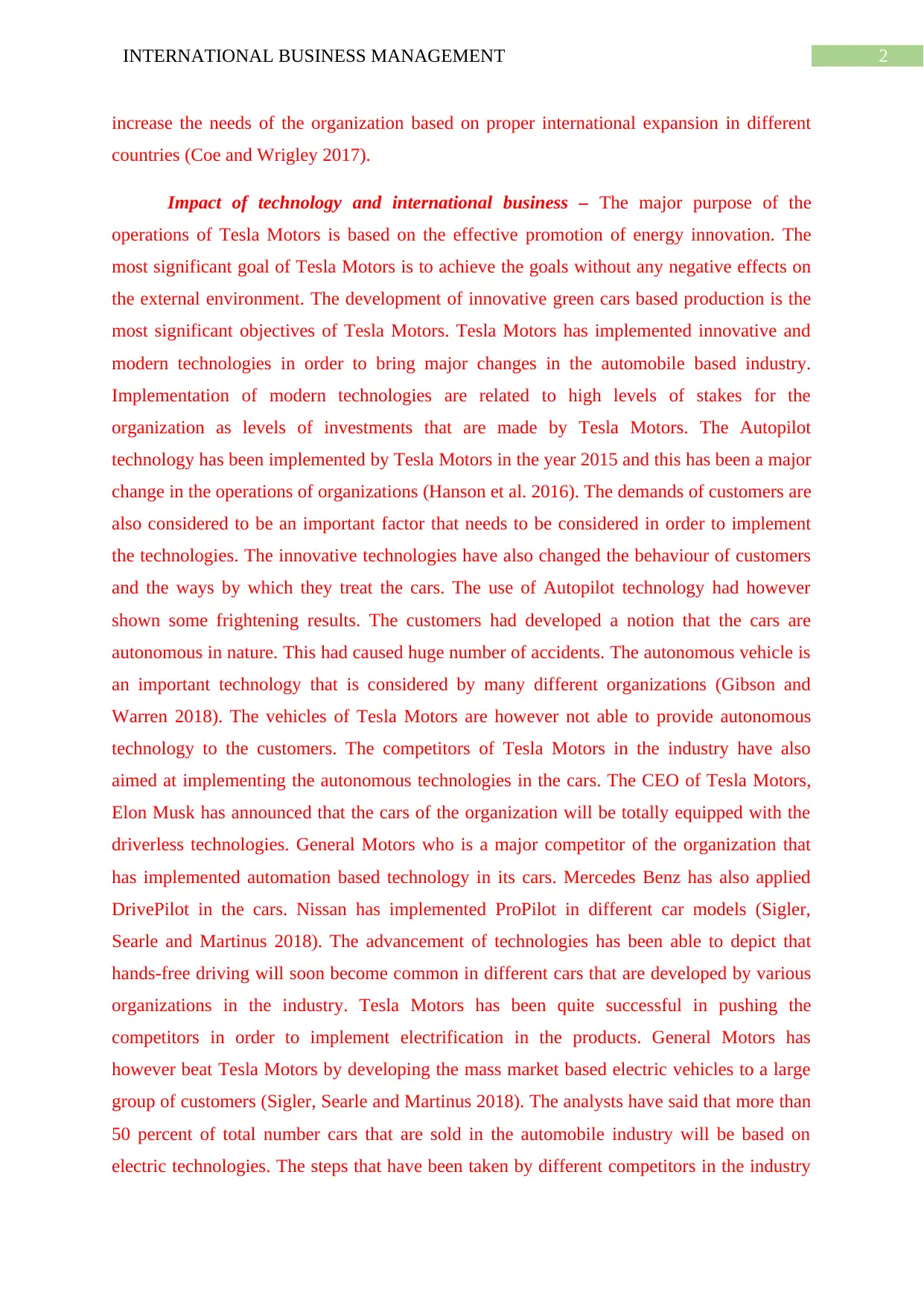
2INTERNATIONAL BUSINESS MANAGEMENT
increase the needs of the organization based on proper international expansion in different
countries (Coe and Wrigley 2017).
Impact of technology and international business – The major purpose of the
operations of Tesla Motors is based on the effective promotion of energy innovation. The
most significant goal of Tesla Motors is to achieve the goals without any negative effects on
the external environment. The development of innovative green cars based production is the
most significant objectives of Tesla Motors. Tesla Motors has implemented innovative and
modern technologies in order to bring major changes in the automobile based industry.
Implementation of modern technologies are related to high levels of stakes for the
organization as levels of investments that are made by Tesla Motors. The Autopilot
technology has been implemented by Tesla Motors in the year 2015 and this has been a major
change in the operations of organizations (Hanson et al. 2016). The demands of customers are
also considered to be an important factor that needs to be considered in order to implement
the technologies. The innovative technologies have also changed the behaviour of customers
and the ways by which they treat the cars. The use of Autopilot technology had however
shown some frightening results. The customers had developed a notion that the cars are
autonomous in nature. This had caused huge number of accidents. The autonomous vehicle is
an important technology that is considered by many different organizations (Gibson and
Warren 2018). The vehicles of Tesla Motors are however not able to provide autonomous
technology to the customers. The competitors of Tesla Motors in the industry have also
aimed at implementing the autonomous technologies in the cars. The CEO of Tesla Motors,
Elon Musk has announced that the cars of the organization will be totally equipped with the
driverless technologies. General Motors who is a major competitor of the organization that
has implemented automation based technology in its cars. Mercedes Benz has also applied
DrivePilot in the cars. Nissan has implemented ProPilot in different car models (Sigler,
Searle and Martinus 2018). The advancement of technologies has been able to depict that
hands-free driving will soon become common in different cars that are developed by various
organizations in the industry. Tesla Motors has been quite successful in pushing the
competitors in order to implement electrification in the products. General Motors has
however beat Tesla Motors by developing the mass market based electric vehicles to a large
group of customers (Sigler, Searle and Martinus 2018). The analysts have said that more than
50 percent of total number cars that are sold in the automobile industry will be based on
electric technologies. The steps that have been taken by different competitors in the industry
increase the needs of the organization based on proper international expansion in different
countries (Coe and Wrigley 2017).
Impact of technology and international business – The major purpose of the
operations of Tesla Motors is based on the effective promotion of energy innovation. The
most significant goal of Tesla Motors is to achieve the goals without any negative effects on
the external environment. The development of innovative green cars based production is the
most significant objectives of Tesla Motors. Tesla Motors has implemented innovative and
modern technologies in order to bring major changes in the automobile based industry.
Implementation of modern technologies are related to high levels of stakes for the
organization as levels of investments that are made by Tesla Motors. The Autopilot
technology has been implemented by Tesla Motors in the year 2015 and this has been a major
change in the operations of organizations (Hanson et al. 2016). The demands of customers are
also considered to be an important factor that needs to be considered in order to implement
the technologies. The innovative technologies have also changed the behaviour of customers
and the ways by which they treat the cars. The use of Autopilot technology had however
shown some frightening results. The customers had developed a notion that the cars are
autonomous in nature. This had caused huge number of accidents. The autonomous vehicle is
an important technology that is considered by many different organizations (Gibson and
Warren 2018). The vehicles of Tesla Motors are however not able to provide autonomous
technology to the customers. The competitors of Tesla Motors in the industry have also
aimed at implementing the autonomous technologies in the cars. The CEO of Tesla Motors,
Elon Musk has announced that the cars of the organization will be totally equipped with the
driverless technologies. General Motors who is a major competitor of the organization that
has implemented automation based technology in its cars. Mercedes Benz has also applied
DrivePilot in the cars. Nissan has implemented ProPilot in different car models (Sigler,
Searle and Martinus 2018). The advancement of technologies has been able to depict that
hands-free driving will soon become common in different cars that are developed by various
organizations in the industry. Tesla Motors has been quite successful in pushing the
competitors in order to implement electrification in the products. General Motors has
however beat Tesla Motors by developing the mass market based electric vehicles to a large
group of customers (Sigler, Searle and Martinus 2018). The analysts have said that more than
50 percent of total number cars that are sold in the automobile industry will be based on
electric technologies. The steps that have been taken by different competitors in the industry
⊘ This is a preview!⊘
Do you want full access?
Subscribe today to unlock all pages.

Trusted by 1+ million students worldwide
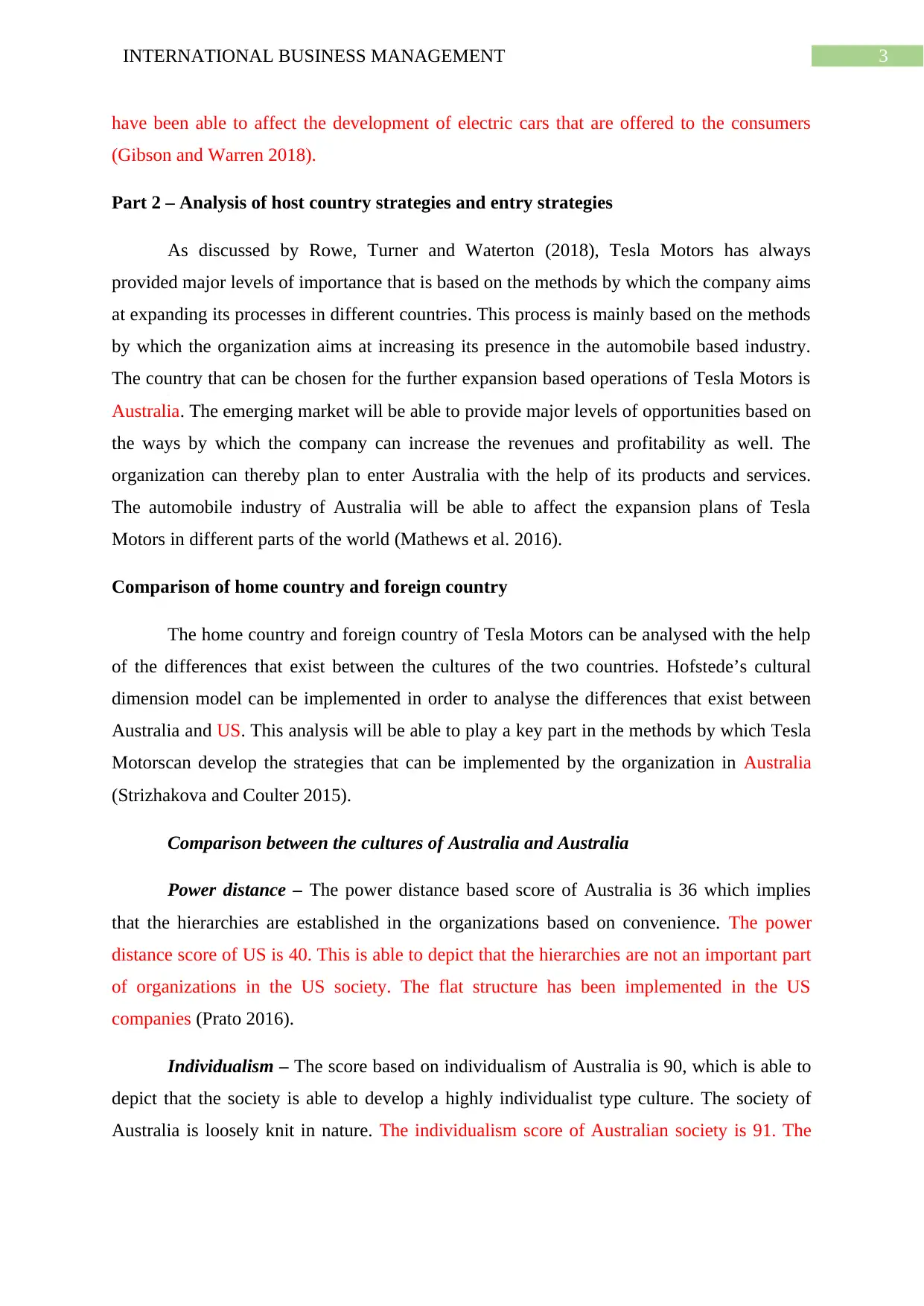
3INTERNATIONAL BUSINESS MANAGEMENT
have been able to affect the development of electric cars that are offered to the consumers
(Gibson and Warren 2018).
Part 2 – Analysis of host country strategies and entry strategies
As discussed by Rowe, Turner and Waterton (2018), Tesla Motors has always
provided major levels of importance that is based on the methods by which the company aims
at expanding its processes in different countries. This process is mainly based on the methods
by which the organization aims at increasing its presence in the automobile based industry.
The country that can be chosen for the further expansion based operations of Tesla Motors is
Australia. The emerging market will be able to provide major levels of opportunities based on
the ways by which the company can increase the revenues and profitability as well. The
organization can thereby plan to enter Australia with the help of its products and services.
The automobile industry of Australia will be able to affect the expansion plans of Tesla
Motors in different parts of the world (Mathews et al. 2016).
Comparison of home country and foreign country
The home country and foreign country of Tesla Motors can be analysed with the help
of the differences that exist between the cultures of the two countries. Hofstede’s cultural
dimension model can be implemented in order to analyse the differences that exist between
Australia and US. This analysis will be able to play a key part in the methods by which Tesla
Motorscan develop the strategies that can be implemented by the organization in Australia
(Strizhakova and Coulter 2015).
Comparison between the cultures of Australia and Australia
Power distance – The power distance based score of Australia is 36 which implies
that the hierarchies are established in the organizations based on convenience. The power
distance score of US is 40. This is able to depict that the hierarchies are not an important part
of organizations in the US society. The flat structure has been implemented in the US
companies (Prato 2016).
Individualism – The score based on individualism of Australia is 90, which is able to
depict that the society is able to develop a highly individualist type culture. The society of
Australia is loosely knit in nature. The individualism score of Australian society is 91. The
have been able to affect the development of electric cars that are offered to the consumers
(Gibson and Warren 2018).
Part 2 – Analysis of host country strategies and entry strategies
As discussed by Rowe, Turner and Waterton (2018), Tesla Motors has always
provided major levels of importance that is based on the methods by which the company aims
at expanding its processes in different countries. This process is mainly based on the methods
by which the organization aims at increasing its presence in the automobile based industry.
The country that can be chosen for the further expansion based operations of Tesla Motors is
Australia. The emerging market will be able to provide major levels of opportunities based on
the ways by which the company can increase the revenues and profitability as well. The
organization can thereby plan to enter Australia with the help of its products and services.
The automobile industry of Australia will be able to affect the expansion plans of Tesla
Motors in different parts of the world (Mathews et al. 2016).
Comparison of home country and foreign country
The home country and foreign country of Tesla Motors can be analysed with the help
of the differences that exist between the cultures of the two countries. Hofstede’s cultural
dimension model can be implemented in order to analyse the differences that exist between
Australia and US. This analysis will be able to play a key part in the methods by which Tesla
Motorscan develop the strategies that can be implemented by the organization in Australia
(Strizhakova and Coulter 2015).
Comparison between the cultures of Australia and Australia
Power distance – The power distance based score of Australia is 36 which implies
that the hierarchies are established in the organizations based on convenience. The power
distance score of US is 40. This is able to depict that the hierarchies are not an important part
of organizations in the US society. The flat structure has been implemented in the US
companies (Prato 2016).
Individualism – The score based on individualism of Australia is 90, which is able to
depict that the society is able to develop a highly individualist type culture. The society of
Australia is loosely knit in nature. The individualism score of Australian society is 91. The
Paraphrase This Document
Need a fresh take? Get an instant paraphrase of this document with our AI Paraphraser
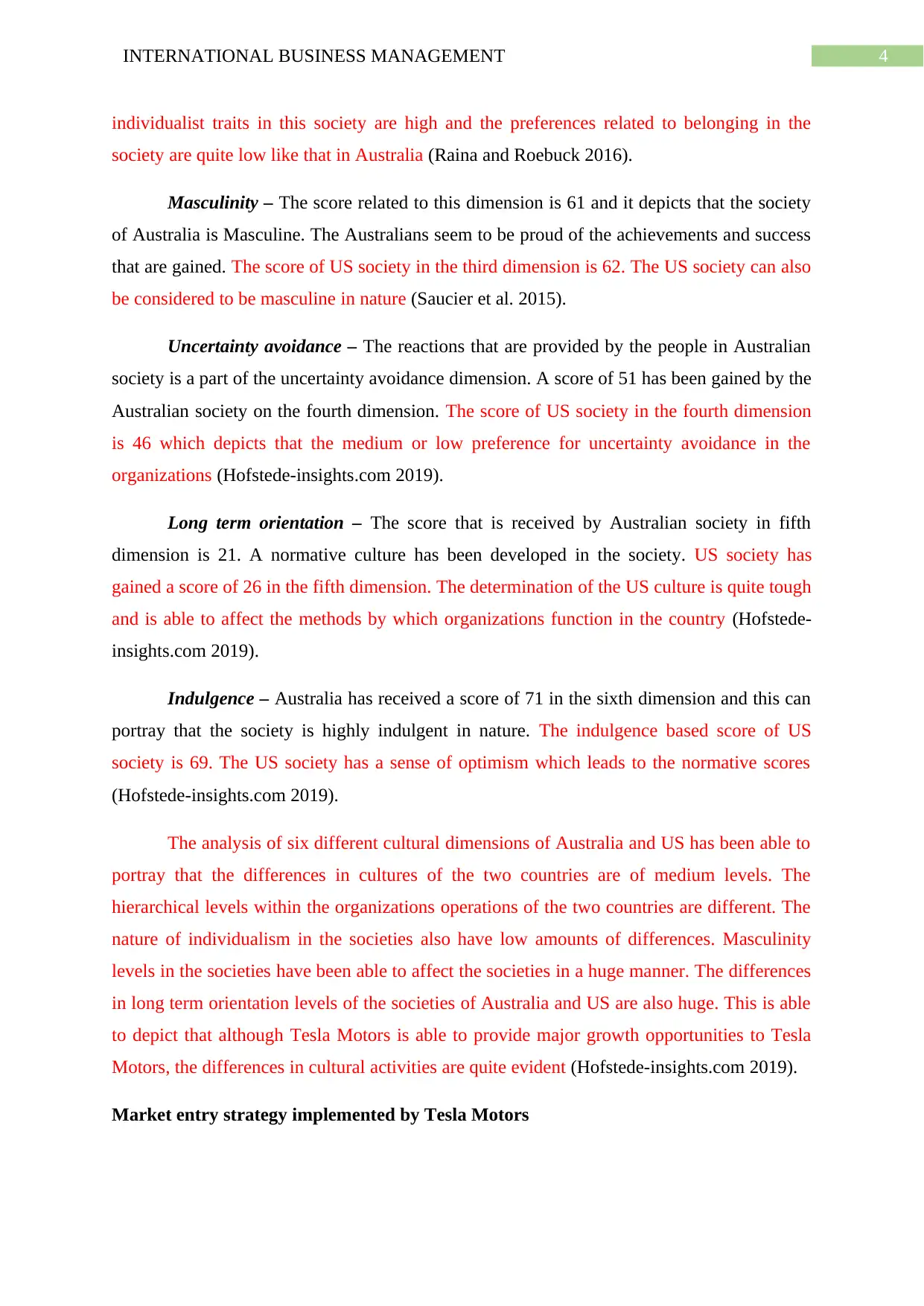
4INTERNATIONAL BUSINESS MANAGEMENT
individualist traits in this society are high and the preferences related to belonging in the
society are quite low like that in Australia (Raina and Roebuck 2016).
Masculinity – The score related to this dimension is 61 and it depicts that the society
of Australia is Masculine. The Australians seem to be proud of the achievements and success
that are gained. The score of US society in the third dimension is 62. The US society can also
be considered to be masculine in nature (Saucier et al. 2015).
Uncertainty avoidance – The reactions that are provided by the people in Australian
society is a part of the uncertainty avoidance dimension. A score of 51 has been gained by the
Australian society on the fourth dimension. The score of US society in the fourth dimension
is 46 which depicts that the medium or low preference for uncertainty avoidance in the
organizations (Hofstede-insights.com 2019).
Long term orientation – The score that is received by Australian society in fifth
dimension is 21. A normative culture has been developed in the society. US society has
gained a score of 26 in the fifth dimension. The determination of the US culture is quite tough
and is able to affect the methods by which organizations function in the country (Hofstede-
insights.com 2019).
Indulgence – Australia has received a score of 71 in the sixth dimension and this can
portray that the society is highly indulgent in nature. The indulgence based score of US
society is 69. The US society has a sense of optimism which leads to the normative scores
(Hofstede-insights.com 2019).
The analysis of six different cultural dimensions of Australia and US has been able to
portray that the differences in cultures of the two countries are of medium levels. The
hierarchical levels within the organizations operations of the two countries are different. The
nature of individualism in the societies also have low amounts of differences. Masculinity
levels in the societies have been able to affect the societies in a huge manner. The differences
in long term orientation levels of the societies of Australia and US are also huge. This is able
to depict that although Tesla Motors is able to provide major growth opportunities to Tesla
Motors, the differences in cultural activities are quite evident (Hofstede-insights.com 2019).
Market entry strategy implemented by Tesla Motors
individualist traits in this society are high and the preferences related to belonging in the
society are quite low like that in Australia (Raina and Roebuck 2016).
Masculinity – The score related to this dimension is 61 and it depicts that the society
of Australia is Masculine. The Australians seem to be proud of the achievements and success
that are gained. The score of US society in the third dimension is 62. The US society can also
be considered to be masculine in nature (Saucier et al. 2015).
Uncertainty avoidance – The reactions that are provided by the people in Australian
society is a part of the uncertainty avoidance dimension. A score of 51 has been gained by the
Australian society on the fourth dimension. The score of US society in the fourth dimension
is 46 which depicts that the medium or low preference for uncertainty avoidance in the
organizations (Hofstede-insights.com 2019).
Long term orientation – The score that is received by Australian society in fifth
dimension is 21. A normative culture has been developed in the society. US society has
gained a score of 26 in the fifth dimension. The determination of the US culture is quite tough
and is able to affect the methods by which organizations function in the country (Hofstede-
insights.com 2019).
Indulgence – Australia has received a score of 71 in the sixth dimension and this can
portray that the society is highly indulgent in nature. The indulgence based score of US
society is 69. The US society has a sense of optimism which leads to the normative scores
(Hofstede-insights.com 2019).
The analysis of six different cultural dimensions of Australia and US has been able to
portray that the differences in cultures of the two countries are of medium levels. The
hierarchical levels within the organizations operations of the two countries are different. The
nature of individualism in the societies also have low amounts of differences. Masculinity
levels in the societies have been able to affect the societies in a huge manner. The differences
in long term orientation levels of the societies of Australia and US are also huge. This is able
to depict that although Tesla Motors is able to provide major growth opportunities to Tesla
Motors, the differences in cultural activities are quite evident (Hofstede-insights.com 2019).
Market entry strategy implemented by Tesla Motors
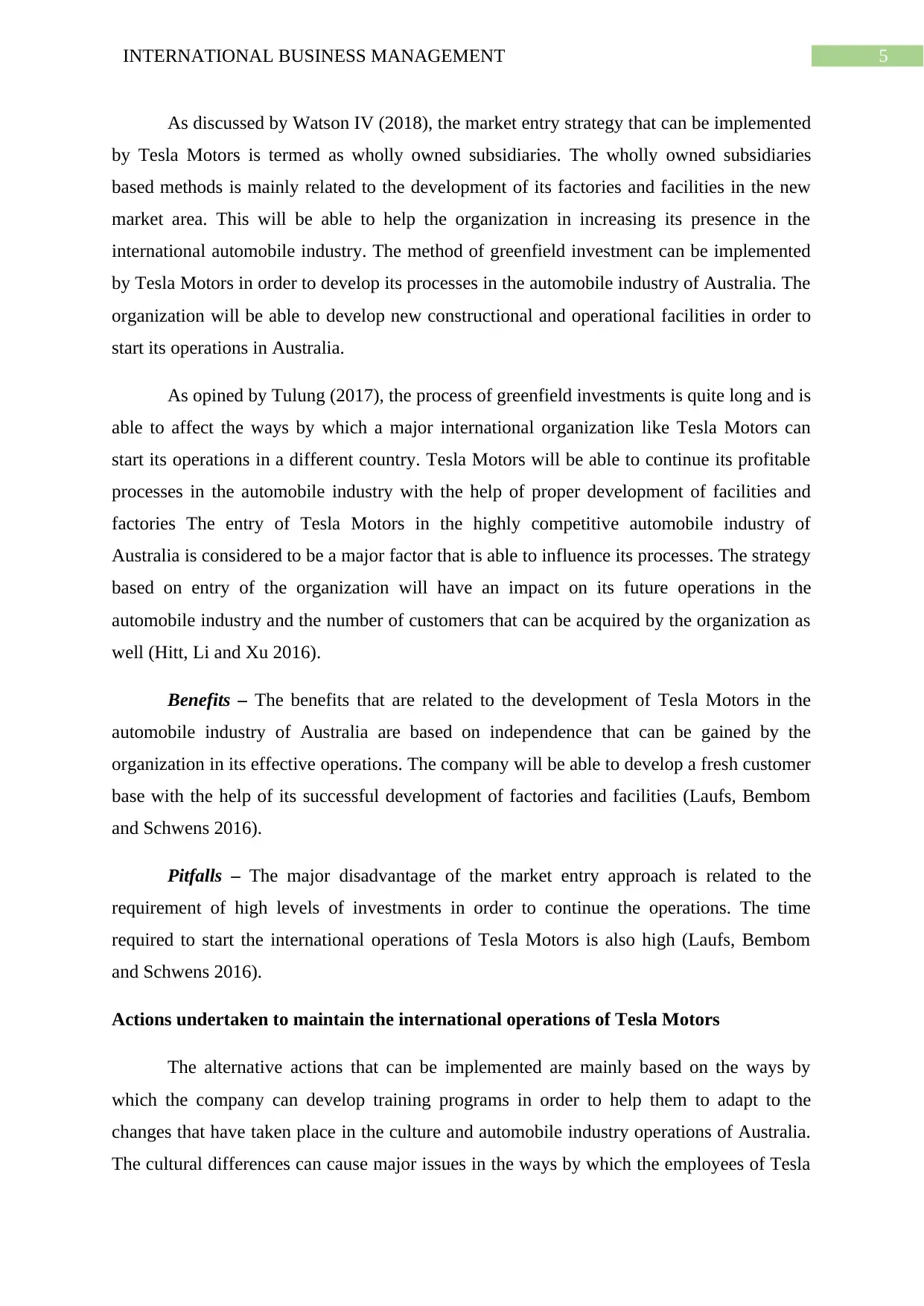
5INTERNATIONAL BUSINESS MANAGEMENT
As discussed by Watson IV (2018), the market entry strategy that can be implemented
by Tesla Motors is termed as wholly owned subsidiaries. The wholly owned subsidiaries
based methods is mainly related to the development of its factories and facilities in the new
market area. This will be able to help the organization in increasing its presence in the
international automobile industry. The method of greenfield investment can be implemented
by Tesla Motors in order to develop its processes in the automobile industry of Australia. The
organization will be able to develop new constructional and operational facilities in order to
start its operations in Australia.
As opined by Tulung (2017), the process of greenfield investments is quite long and is
able to affect the ways by which a major international organization like Tesla Motors can
start its operations in a different country. Tesla Motors will be able to continue its profitable
processes in the automobile industry with the help of proper development of facilities and
factories The entry of Tesla Motors in the highly competitive automobile industry of
Australia is considered to be a major factor that is able to influence its processes. The strategy
based on entry of the organization will have an impact on its future operations in the
automobile industry and the number of customers that can be acquired by the organization as
well (Hitt, Li and Xu 2016).
Benefits – The benefits that are related to the development of Tesla Motors in the
automobile industry of Australia are based on independence that can be gained by the
organization in its effective operations. The company will be able to develop a fresh customer
base with the help of its successful development of factories and facilities (Laufs, Bembom
and Schwens 2016).
Pitfalls – The major disadvantage of the market entry approach is related to the
requirement of high levels of investments in order to continue the operations. The time
required to start the international operations of Tesla Motors is also high (Laufs, Bembom
and Schwens 2016).
Actions undertaken to maintain the international operations of Tesla Motors
The alternative actions that can be implemented are mainly based on the ways by
which the company can develop training programs in order to help them to adapt to the
changes that have taken place in the culture and automobile industry operations of Australia.
The cultural differences can cause major issues in the ways by which the employees of Tesla
As discussed by Watson IV (2018), the market entry strategy that can be implemented
by Tesla Motors is termed as wholly owned subsidiaries. The wholly owned subsidiaries
based methods is mainly related to the development of its factories and facilities in the new
market area. This will be able to help the organization in increasing its presence in the
international automobile industry. The method of greenfield investment can be implemented
by Tesla Motors in order to develop its processes in the automobile industry of Australia. The
organization will be able to develop new constructional and operational facilities in order to
start its operations in Australia.
As opined by Tulung (2017), the process of greenfield investments is quite long and is
able to affect the ways by which a major international organization like Tesla Motors can
start its operations in a different country. Tesla Motors will be able to continue its profitable
processes in the automobile industry with the help of proper development of facilities and
factories The entry of Tesla Motors in the highly competitive automobile industry of
Australia is considered to be a major factor that is able to influence its processes. The strategy
based on entry of the organization will have an impact on its future operations in the
automobile industry and the number of customers that can be acquired by the organization as
well (Hitt, Li and Xu 2016).
Benefits – The benefits that are related to the development of Tesla Motors in the
automobile industry of Australia are based on independence that can be gained by the
organization in its effective operations. The company will be able to develop a fresh customer
base with the help of its successful development of factories and facilities (Laufs, Bembom
and Schwens 2016).
Pitfalls – The major disadvantage of the market entry approach is related to the
requirement of high levels of investments in order to continue the operations. The time
required to start the international operations of Tesla Motors is also high (Laufs, Bembom
and Schwens 2016).
Actions undertaken to maintain the international operations of Tesla Motors
The alternative actions that can be implemented are mainly based on the ways by
which the company can develop training programs in order to help them to adapt to the
changes that have taken place in the culture and automobile industry operations of Australia.
The cultural differences can cause major issues in the ways by which the employees of Tesla
⊘ This is a preview!⊘
Do you want full access?
Subscribe today to unlock all pages.

Trusted by 1+ million students worldwide
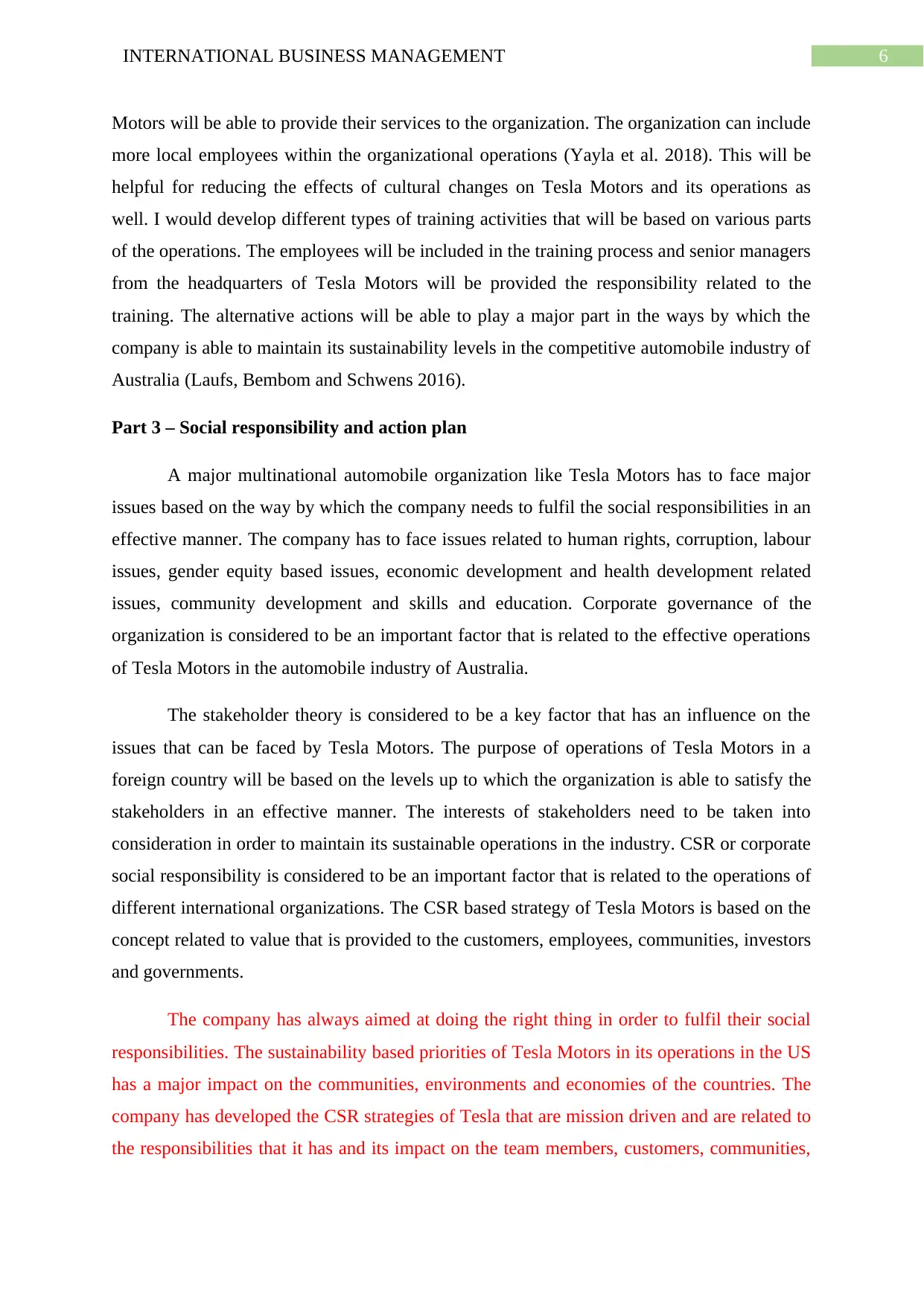
6INTERNATIONAL BUSINESS MANAGEMENT
Motors will be able to provide their services to the organization. The organization can include
more local employees within the organizational operations (Yayla et al. 2018). This will be
helpful for reducing the effects of cultural changes on Tesla Motors and its operations as
well. I would develop different types of training activities that will be based on various parts
of the operations. The employees will be included in the training process and senior managers
from the headquarters of Tesla Motors will be provided the responsibility related to the
training. The alternative actions will be able to play a major part in the ways by which the
company is able to maintain its sustainability levels in the competitive automobile industry of
Australia (Laufs, Bembom and Schwens 2016).
Part 3 – Social responsibility and action plan
A major multinational automobile organization like Tesla Motors has to face major
issues based on the way by which the company needs to fulfil the social responsibilities in an
effective manner. The company has to face issues related to human rights, corruption, labour
issues, gender equity based issues, economic development and health development related
issues, community development and skills and education. Corporate governance of the
organization is considered to be an important factor that is related to the effective operations
of Tesla Motors in the automobile industry of Australia.
The stakeholder theory is considered to be a key factor that has an influence on the
issues that can be faced by Tesla Motors. The purpose of operations of Tesla Motors in a
foreign country will be based on the levels up to which the organization is able to satisfy the
stakeholders in an effective manner. The interests of stakeholders need to be taken into
consideration in order to maintain its sustainable operations in the industry. CSR or corporate
social responsibility is considered to be an important factor that is related to the operations of
different international organizations. The CSR based strategy of Tesla Motors is based on the
concept related to value that is provided to the customers, employees, communities, investors
and governments.
The company has always aimed at doing the right thing in order to fulfil their social
responsibilities. The sustainability based priorities of Tesla Motors in its operations in the US
has a major impact on the communities, environments and economies of the countries. The
company has developed the CSR strategies of Tesla that are mission driven and are related to
the responsibilities that it has and its impact on the team members, customers, communities,
Motors will be able to provide their services to the organization. The organization can include
more local employees within the organizational operations (Yayla et al. 2018). This will be
helpful for reducing the effects of cultural changes on Tesla Motors and its operations as
well. I would develop different types of training activities that will be based on various parts
of the operations. The employees will be included in the training process and senior managers
from the headquarters of Tesla Motors will be provided the responsibility related to the
training. The alternative actions will be able to play a major part in the ways by which the
company is able to maintain its sustainability levels in the competitive automobile industry of
Australia (Laufs, Bembom and Schwens 2016).
Part 3 – Social responsibility and action plan
A major multinational automobile organization like Tesla Motors has to face major
issues based on the way by which the company needs to fulfil the social responsibilities in an
effective manner. The company has to face issues related to human rights, corruption, labour
issues, gender equity based issues, economic development and health development related
issues, community development and skills and education. Corporate governance of the
organization is considered to be an important factor that is related to the effective operations
of Tesla Motors in the automobile industry of Australia.
The stakeholder theory is considered to be a key factor that has an influence on the
issues that can be faced by Tesla Motors. The purpose of operations of Tesla Motors in a
foreign country will be based on the levels up to which the organization is able to satisfy the
stakeholders in an effective manner. The interests of stakeholders need to be taken into
consideration in order to maintain its sustainable operations in the industry. CSR or corporate
social responsibility is considered to be an important factor that is related to the operations of
different international organizations. The CSR based strategy of Tesla Motors is based on the
concept related to value that is provided to the customers, employees, communities, investors
and governments.
The company has always aimed at doing the right thing in order to fulfil their social
responsibilities. The sustainability based priorities of Tesla Motors in its operations in the US
has a major impact on the communities, environments and economies of the countries. The
company has developed the CSR strategies of Tesla that are mission driven and are related to
the responsibilities that it has and its impact on the team members, customers, communities,
Paraphrase This Document
Need a fresh take? Get an instant paraphrase of this document with our AI Paraphraser
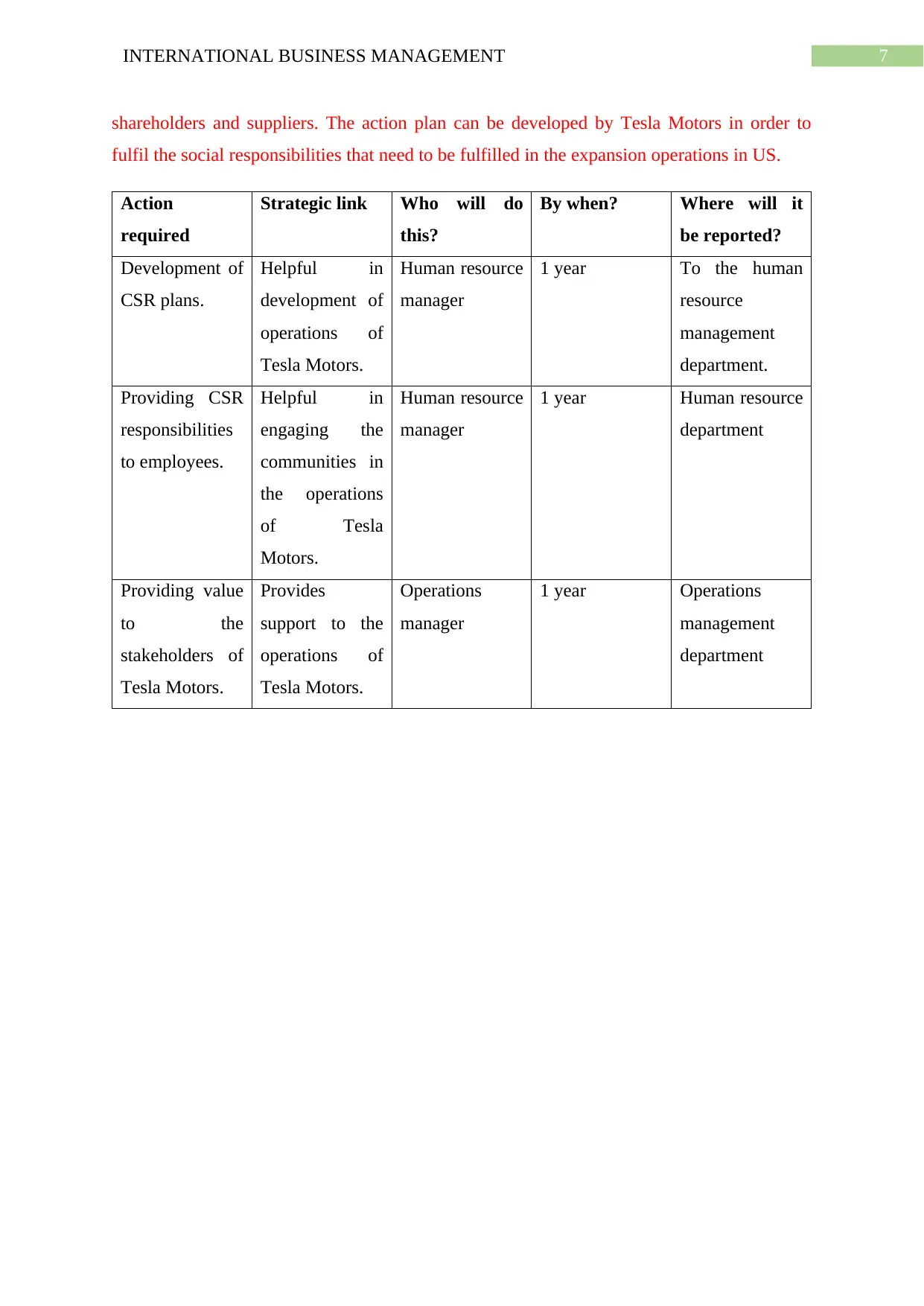
7INTERNATIONAL BUSINESS MANAGEMENT
shareholders and suppliers. The action plan can be developed by Tesla Motors in order to
fulfil the social responsibilities that need to be fulfilled in the expansion operations in US.
Action
required
Strategic link Who will do
this?
By when? Where will it
be reported?
Development of
CSR plans.
Helpful in
development of
operations of
Tesla Motors.
Human resource
manager
1 year To the human
resource
management
department.
Providing CSR
responsibilities
to employees.
Helpful in
engaging the
communities in
the operations
of Tesla
Motors.
Human resource
manager
1 year Human resource
department
Providing value
to the
stakeholders of
Tesla Motors.
Provides
support to the
operations of
Tesla Motors.
Operations
manager
1 year Operations
management
department
shareholders and suppliers. The action plan can be developed by Tesla Motors in order to
fulfil the social responsibilities that need to be fulfilled in the expansion operations in US.
Action
required
Strategic link Who will do
this?
By when? Where will it
be reported?
Development of
CSR plans.
Helpful in
development of
operations of
Tesla Motors.
Human resource
manager
1 year To the human
resource
management
department.
Providing CSR
responsibilities
to employees.
Helpful in
engaging the
communities in
the operations
of Tesla
Motors.
Human resource
manager
1 year Human resource
department
Providing value
to the
stakeholders of
Tesla Motors.
Provides
support to the
operations of
Tesla Motors.
Operations
manager
1 year Operations
management
department
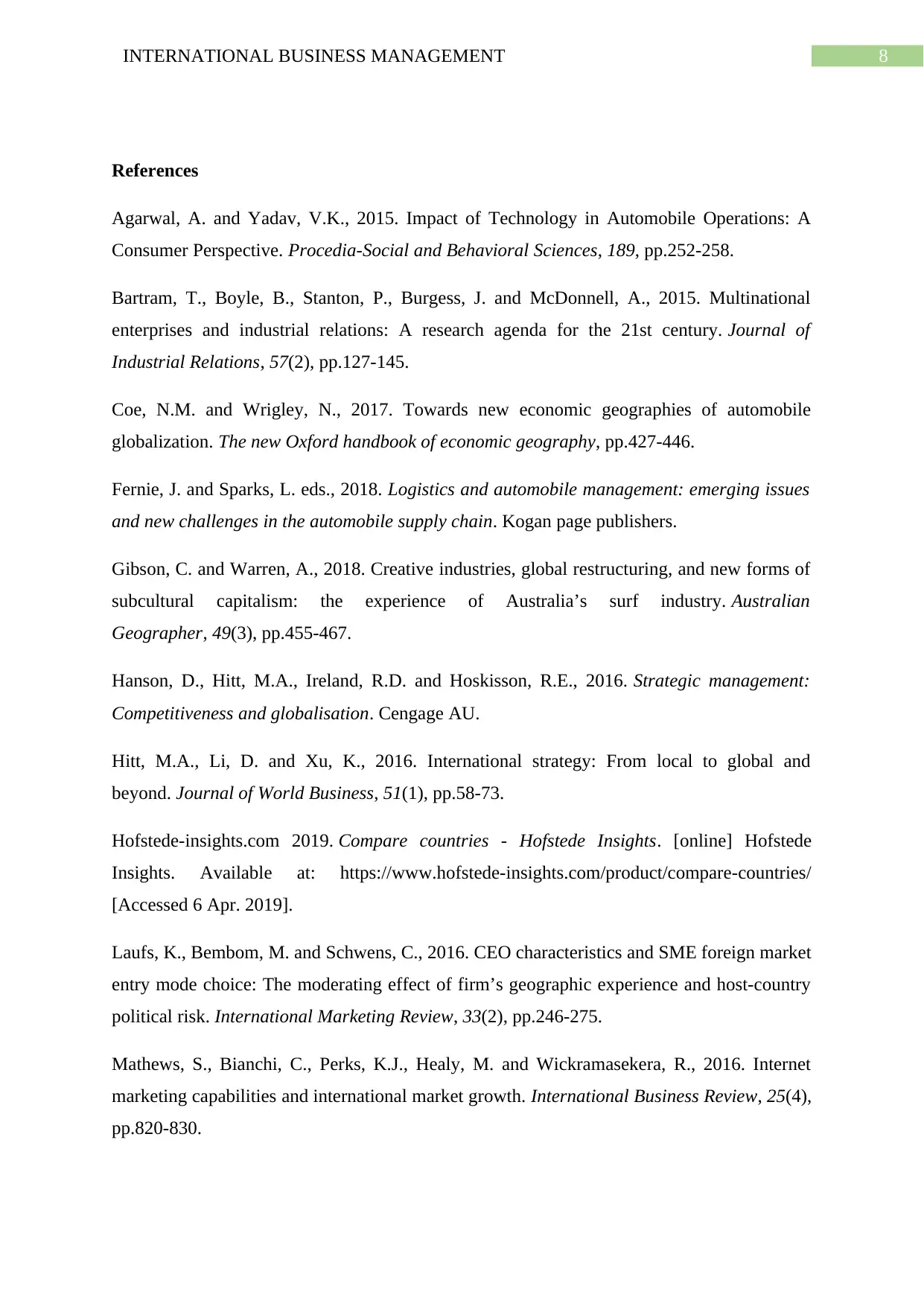
8INTERNATIONAL BUSINESS MANAGEMENT
References
Agarwal, A. and Yadav, V.K., 2015. Impact of Technology in Automobile Operations: A
Consumer Perspective. Procedia-Social and Behavioral Sciences, 189, pp.252-258.
Bartram, T., Boyle, B., Stanton, P., Burgess, J. and McDonnell, A., 2015. Multinational
enterprises and industrial relations: A research agenda for the 21st century. Journal of
Industrial Relations, 57(2), pp.127-145.
Coe, N.M. and Wrigley, N., 2017. Towards new economic geographies of automobile
globalization. The new Oxford handbook of economic geography, pp.427-446.
Fernie, J. and Sparks, L. eds., 2018. Logistics and automobile management: emerging issues
and new challenges in the automobile supply chain. Kogan page publishers.
Gibson, C. and Warren, A., 2018. Creative industries, global restructuring, and new forms of
subcultural capitalism: the experience of Australia’s surf industry. Australian
Geographer, 49(3), pp.455-467.
Hanson, D., Hitt, M.A., Ireland, R.D. and Hoskisson, R.E., 2016. Strategic management:
Competitiveness and globalisation. Cengage AU.
Hitt, M.A., Li, D. and Xu, K., 2016. International strategy: From local to global and
beyond. Journal of World Business, 51(1), pp.58-73.
Hofstede-insights.com 2019. Compare countries - Hofstede Insights. [online] Hofstede
Insights. Available at: https://www.hofstede-insights.com/product/compare-countries/
[Accessed 6 Apr. 2019].
Laufs, K., Bembom, M. and Schwens, C., 2016. CEO characteristics and SME foreign market
entry mode choice: The moderating effect of firm’s geographic experience and host-country
political risk. International Marketing Review, 33(2), pp.246-275.
Mathews, S., Bianchi, C., Perks, K.J., Healy, M. and Wickramasekera, R., 2016. Internet
marketing capabilities and international market growth. International Business Review, 25(4),
pp.820-830.
References
Agarwal, A. and Yadav, V.K., 2015. Impact of Technology in Automobile Operations: A
Consumer Perspective. Procedia-Social and Behavioral Sciences, 189, pp.252-258.
Bartram, T., Boyle, B., Stanton, P., Burgess, J. and McDonnell, A., 2015. Multinational
enterprises and industrial relations: A research agenda for the 21st century. Journal of
Industrial Relations, 57(2), pp.127-145.
Coe, N.M. and Wrigley, N., 2017. Towards new economic geographies of automobile
globalization. The new Oxford handbook of economic geography, pp.427-446.
Fernie, J. and Sparks, L. eds., 2018. Logistics and automobile management: emerging issues
and new challenges in the automobile supply chain. Kogan page publishers.
Gibson, C. and Warren, A., 2018. Creative industries, global restructuring, and new forms of
subcultural capitalism: the experience of Australia’s surf industry. Australian
Geographer, 49(3), pp.455-467.
Hanson, D., Hitt, M.A., Ireland, R.D. and Hoskisson, R.E., 2016. Strategic management:
Competitiveness and globalisation. Cengage AU.
Hitt, M.A., Li, D. and Xu, K., 2016. International strategy: From local to global and
beyond. Journal of World Business, 51(1), pp.58-73.
Hofstede-insights.com 2019. Compare countries - Hofstede Insights. [online] Hofstede
Insights. Available at: https://www.hofstede-insights.com/product/compare-countries/
[Accessed 6 Apr. 2019].
Laufs, K., Bembom, M. and Schwens, C., 2016. CEO characteristics and SME foreign market
entry mode choice: The moderating effect of firm’s geographic experience and host-country
political risk. International Marketing Review, 33(2), pp.246-275.
Mathews, S., Bianchi, C., Perks, K.J., Healy, M. and Wickramasekera, R., 2016. Internet
marketing capabilities and international market growth. International Business Review, 25(4),
pp.820-830.
⊘ This is a preview!⊘
Do you want full access?
Subscribe today to unlock all pages.

Trusted by 1+ million students worldwide
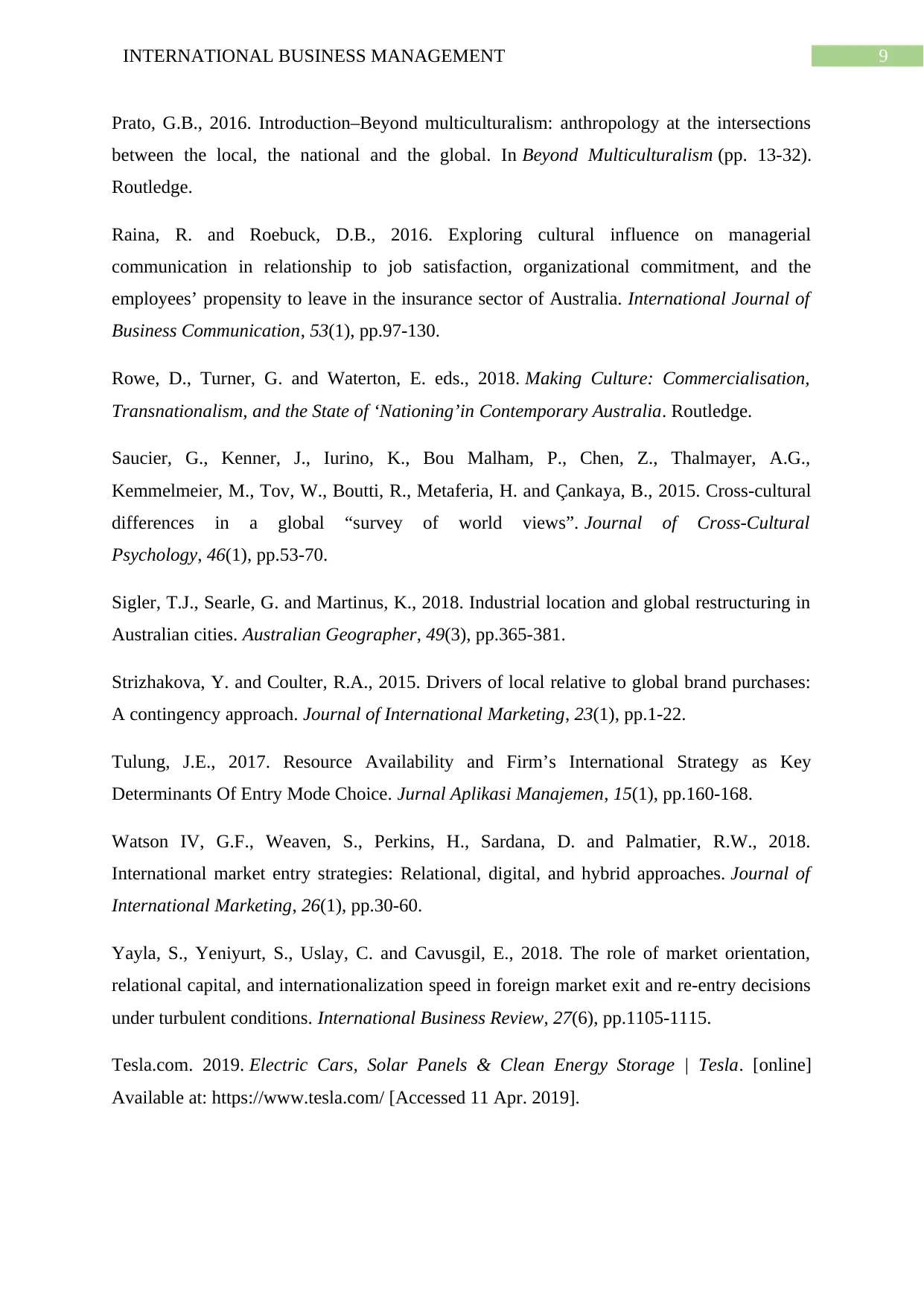
9INTERNATIONAL BUSINESS MANAGEMENT
Prato, G.B., 2016. Introduction–Beyond multiculturalism: anthropology at the intersections
between the local, the national and the global. In Beyond Multiculturalism (pp. 13-32).
Routledge.
Raina, R. and Roebuck, D.B., 2016. Exploring cultural influence on managerial
communication in relationship to job satisfaction, organizational commitment, and the
employees’ propensity to leave in the insurance sector of Australia. International Journal of
Business Communication, 53(1), pp.97-130.
Rowe, D., Turner, G. and Waterton, E. eds., 2018. Making Culture: Commercialisation,
Transnationalism, and the State of ‘Nationing’in Contemporary Australia. Routledge.
Saucier, G., Kenner, J., Iurino, K., Bou Malham, P., Chen, Z., Thalmayer, A.G.,
Kemmelmeier, M., Tov, W., Boutti, R., Metaferia, H. and Çankaya, B., 2015. Cross-cultural
differences in a global “survey of world views”. Journal of Cross-Cultural
Psychology, 46(1), pp.53-70.
Sigler, T.J., Searle, G. and Martinus, K., 2018. Industrial location and global restructuring in
Australian cities. Australian Geographer, 49(3), pp.365-381.
Strizhakova, Y. and Coulter, R.A., 2015. Drivers of local relative to global brand purchases:
A contingency approach. Journal of International Marketing, 23(1), pp.1-22.
Tulung, J.E., 2017. Resource Availability and Firm’s International Strategy as Key
Determinants Of Entry Mode Choice. Jurnal Aplikasi Manajemen, 15(1), pp.160-168.
Watson IV, G.F., Weaven, S., Perkins, H., Sardana, D. and Palmatier, R.W., 2018.
International market entry strategies: Relational, digital, and hybrid approaches. Journal of
International Marketing, 26(1), pp.30-60.
Yayla, S., Yeniyurt, S., Uslay, C. and Cavusgil, E., 2018. The role of market orientation,
relational capital, and internationalization speed in foreign market exit and re-entry decisions
under turbulent conditions. International Business Review, 27(6), pp.1105-1115.
Tesla.com. 2019. Electric Cars, Solar Panels & Clean Energy Storage | Tesla. [online]
Available at: https://www.tesla.com/ [Accessed 11 Apr. 2019].
Prato, G.B., 2016. Introduction–Beyond multiculturalism: anthropology at the intersections
between the local, the national and the global. In Beyond Multiculturalism (pp. 13-32).
Routledge.
Raina, R. and Roebuck, D.B., 2016. Exploring cultural influence on managerial
communication in relationship to job satisfaction, organizational commitment, and the
employees’ propensity to leave in the insurance sector of Australia. International Journal of
Business Communication, 53(1), pp.97-130.
Rowe, D., Turner, G. and Waterton, E. eds., 2018. Making Culture: Commercialisation,
Transnationalism, and the State of ‘Nationing’in Contemporary Australia. Routledge.
Saucier, G., Kenner, J., Iurino, K., Bou Malham, P., Chen, Z., Thalmayer, A.G.,
Kemmelmeier, M., Tov, W., Boutti, R., Metaferia, H. and Çankaya, B., 2015. Cross-cultural
differences in a global “survey of world views”. Journal of Cross-Cultural
Psychology, 46(1), pp.53-70.
Sigler, T.J., Searle, G. and Martinus, K., 2018. Industrial location and global restructuring in
Australian cities. Australian Geographer, 49(3), pp.365-381.
Strizhakova, Y. and Coulter, R.A., 2015. Drivers of local relative to global brand purchases:
A contingency approach. Journal of International Marketing, 23(1), pp.1-22.
Tulung, J.E., 2017. Resource Availability and Firm’s International Strategy as Key
Determinants Of Entry Mode Choice. Jurnal Aplikasi Manajemen, 15(1), pp.160-168.
Watson IV, G.F., Weaven, S., Perkins, H., Sardana, D. and Palmatier, R.W., 2018.
International market entry strategies: Relational, digital, and hybrid approaches. Journal of
International Marketing, 26(1), pp.30-60.
Yayla, S., Yeniyurt, S., Uslay, C. and Cavusgil, E., 2018. The role of market orientation,
relational capital, and internationalization speed in foreign market exit and re-entry decisions
under turbulent conditions. International Business Review, 27(6), pp.1105-1115.
Tesla.com. 2019. Electric Cars, Solar Panels & Clean Energy Storage | Tesla. [online]
Available at: https://www.tesla.com/ [Accessed 11 Apr. 2019].
1 out of 10
Related Documents
Your All-in-One AI-Powered Toolkit for Academic Success.
+13062052269
info@desklib.com
Available 24*7 on WhatsApp / Email
![[object Object]](/_next/static/media/star-bottom.7253800d.svg)
Unlock your academic potential
Copyright © 2020–2026 A2Z Services. All Rights Reserved. Developed and managed by ZUCOL.





